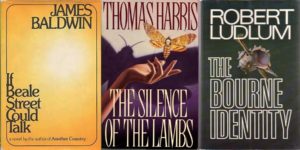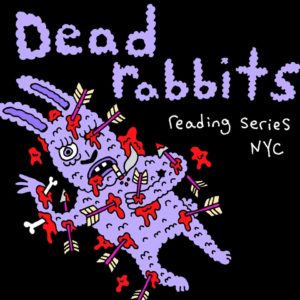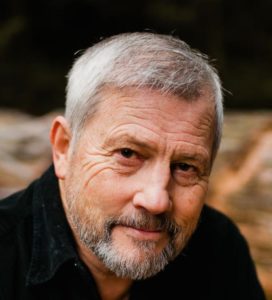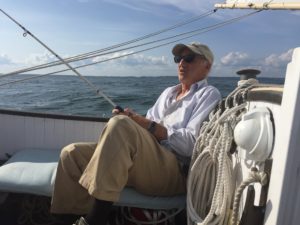Crooked Hallelujah: Kelli Jo Ford
July 20, 2020 by David
Filed under Fiction, WritersCast
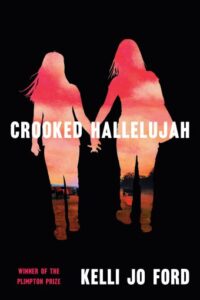 Crooked Hallelujah – Kelli Jo Ford – 978-0-8021-4912-1 – Grove Press – Hardcover – 304 pages – July 14, 2020 – $26.00 – ebook versions available at lower prices.
Crooked Hallelujah – Kelli Jo Ford – 978-0-8021-4912-1 – Grove Press – Hardcover – 304 pages – July 14, 2020 – $26.00 – ebook versions available at lower prices.
Kelli Jo Ford’s novel is a deeply rewarding read. Comparisons to the work of Louise Erdrich are inevitable and unavoidable (and Kelli Jo mentioned Louise in our conversation as one of her most important influences.) This is a novel of relationships and family told through the voices of four generations of Cherokee women and to a lesser extent, the men who come in and out of their lives. The narrative weaves together strands of familial cloth into what emerges as a beautiful and compelling pattern that we experience fully as the story is told.
At the outset of the book, we are in 1974 in the Cherokee Nation, eastern Oklahoma, where fifteen-year-old Justine is growing up in a family dominated by women – her mother, Lula, and her mother’s mother, Granny. We follow Justine, and her daughter, Reney, through a series of challenges in Oklahoma and Texas and back to Oklahoma, where family and roots call out to her.
Kelli Jo Ford is a fine writer, and manages her characters and their stories well. Her intergenerational story is complicated, and the multiple narrative voices take some concentration to follow, but her writing is warm and deft, and we are rewarded in the end by the beauty and depth of her characters and their lives. This family of strong Cherokee women continually face challenges with strength and wisdom. They make the necessary sacrifices for the people in their lives and go on living despite all the difficulties they face. They don’t always get along – these women are real people, not caricatures. They do not always succeed in understanding each other or overcoming the difficulties and challenges they face. There are conflicts over religion and individuality. But these women are bound by blood, heart, and a deeply felt love that carries them forward despite all. I came away from this book with an appreciation for the strength and perceptiveness of Cherokee women.
Kelli Jo Ford is a citizen of the Cherokee Nation of Oklahoma. She is the recipient of numerous awards, a National Artist Fellowship by the Native Arts & Cultures Foundation, and a Dobie Paisano Fellowship. Her fiction has appeared in the Paris Review, Virginia Quarterly Review, Missouri Review, and the anthology Forty Stories: New Writing published by Harper in 2012. She now lives in Virginia with her husband, poet Scott Weaver.
My conversation with Kelli Jo was her first interview about Crooked Hallelujah. She is a new writer many of us will want to follow in the years to come.
Author website here.
Support local business. Buy the book from R.J. Julia Booksellers.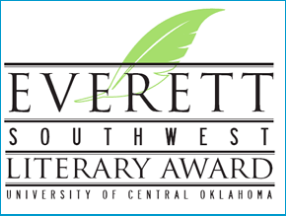
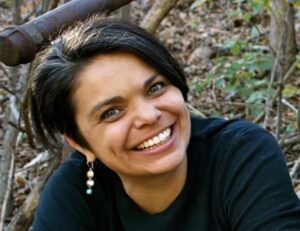
Podcast: Play in new window | Download
Anne Enright: Actress – A Novel
May 12, 2020 by David
Filed under Fiction, WritersCast
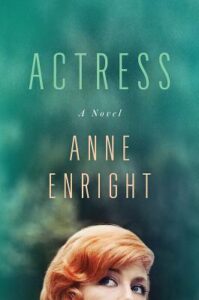 Actress: A Novel – Anne Enright – 978-1-324-00562-9 – W.W. Norton – Hardcover – 272 pages – March 3, 2020 – $26.95 – eBook version available at lower prices
Actress: A Novel – Anne Enright – 978-1-324-00562-9 – W.W. Norton – Hardcover – 272 pages – March 3, 2020 – $26.95 – eBook version available at lower prices
I think it is pretty safe to say that Anne Enright is one of the best writers of our time. Her writing is so well done that you don’t notice her deft ability to portray characters and tell their stories as if you were present at the time.
In some ways, Actress is an unusual novel, structured more like a memoir, albeit a fictional one. The story meanders the way a person might when telling a story about their parents and themselves. Ostensibly Actress is the story of Katherine O’Dell, the narrator’s mother. Norah, the daughter, is herself a writer in mid-career. But as I read the book, it became clear that this book is really about Norah, and while the daughter-mother relationship is central to her story, there are more layers than initially meet the eye here. It’s not so much a fictional portrait of an actress, but a fictional portrait of a writer.
Norah, the writer, has spent her life avoiding writing about her mother. Being the daughter of a famous, even notorious actress, is something she has tried not to deal with, even though it is the grounding of her own life story. That her mother ends up in decline is also defining for her. Katherine was a difficult, mercurial, highly private and complicated person. Her daughter, our narrator, is ultimately more like her mother than she wants to believe or accept. In Enright’s telling, the writer tells the story she must tell, even if it is not always the story she wants to tell.
Aside from being a terrific writer, Anne Enright is an outstanding conversationalist, making her a great subject for an interview. It’s pretty obvious how much I like speaking with writers about their books, and a conversation with Anne Enright is a joy. I am sure that you will enjoy listening to this interview and you will find this book well worth spending some time with. I had the pleasure to speak with her in 2015 about her last novel, The Green Road, another terrific book. Here’s a link, in case you want to listen to that conversation as well.
Anne Enright was born in Dublin in 1962, studied English and Philosophy at Trinity College, Dublin, and studied for an MA in Creative Writing at the University of East Anglia.
She has written short stories that have appeared in magazines including The New Yorker and The Paris Review. In 2004 she received the Davy Byrnes Irish Writing Award for her short story, ‘Honey’. She has published three collections of short stories.
Her novels are The Wig My Father Wore (1995), shortlisted for the Irish Times/Aer Lingus Irish Literature Prize; What Are You Like? which was the winner of the 2001 Encore Award; The Pleasure of Eliza Lynch (2002); The Gathering (2007) which won the 2007 Man Booker Prize for Fiction; and The Forgotten Waltz (2011). Her most recent novel, The Green Road (2015) won the Irish Novel of the Year.
Enright is also the author of a book of humorous essays, Making Babies: Stumbling into Motherhood (2004). She lives in Ireland.
You can buy Actress online from RJ Julia Booksellers in Madison, Connecticut where it is a current Staff Pick.
Podcast: Play in new window | Download
Arthur Phillips: The King at the Edge of the World
April 21, 2020 by David
Filed under Fiction, WritersCast
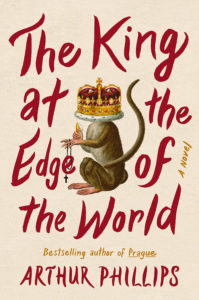 The King at the Edge of the World – Arthur Phillips – 9780812995480 – Random House – Hardcover- 288 pages – $27.00 – February 11, 2020. Ebooks available at lower prices.
The King at the Edge of the World – Arthur Phillips – 9780812995480 – Random House – Hardcover- 288 pages – $27.00 – February 11, 2020. Ebooks available at lower prices.
At Writerscast, there is a strict rule that I only talk to authors whose books I like. So every book that appears here is one that I truly enjoyed reading. Given that fact, it is important to note that Arthur Phillips’ novel, The King at the Edge of the World, is a book I loved reading. It is a great story by a writer in full command of his craft.
I hate giving away plot so I won’t even come close to doing that. Suffice to say, this book takes place at the end of the Elizabethan era (the first Elizabeth, that is). It involves a series of events that lead inexorably to a glorious and satisfying conclusion, beginning with the arrival of a Turkish doctor to England as part of a diplomatic mission and going through a series of sometimes unfortunate and even tragic events. What develops from this quiet beginning is what makes this book so pleasurable to read. And it is full of ideas, ruminations, wonderful characters, all woven together to create a fabric that wraps around you like an old and very comfortable shawl.
“The book is a delightfully rich fruitcake and an old-fashioned pleasure to read; its plot is an intricate set of intersecting mechanisms and locks and keys, which, when they finally all fall into place, provide the reader with the gawping satisfaction of having been well and truly fooled,” Dominic Dromgoole writes in his review. “Simply writing for the reader’s pleasure seems to be increasingly rare these days, and to pick up a book like The King at the Edge of the World, which contains teasing philosophical and theological ideas within an unapologetic entertainment, is a small mercy for which much gratitude is due.”
A New York Times Editor’s Choice selection
I’ve spoken to Arthur before. In 2009 – so long ago, it seems – we talked about an earlier novel of his, The Song is You, another wonderful book. Arthur is a distant relative of mine and it is a wonderful thing to have such a terrific writer in the family.
Arthur Phillips was born in Minneapolis and educated at Harvard. He has been a child actor, a jazz musician, a speechwriter, a failed entrepreneur, and strikingly, he as been a five-time Jeopardy! champion.
His first novel, Prague, was a New York Times Notable Book, and received the Los Angeles Times/Art Seidenbaum Award for best first novel. His second novel, The Egyptologist, was an international bestseller in 2004. His third novel, Angelica, made The Washington Post list of best fiction of 2007 and that paper called him “One of the best writers in America.” The Song Is You was a New York Times Notable Book, and Kirkus wrote, “Phillips still looks like the best American novelist to have emerged in the present decade.” His fifth book, The Tragedy of Arthur, was published in 2011 to critical acclaim, and like its predecessors, and was named a New York Times Notable Book.
The play taken from that book received its world premiere reading at New York’s Public Theater in 2011 and became a full stage production in 2013, under the auspices of the Guerrilla Shakespeare Project. His short story, Companionship, was adapted into an opera by Rachel Peters and debuted at the Fort Worth Opera in 2019.
The film version of Angelica was released in 2015, and other films based on his work are currently in development. His work has been published in twenty-seven languages.
He has written for television, including Damages (FX/DirecTV), Bloodline (Netflix), Tokyo Vice (HBOMax) and he has further television pilots in development.
Arthur lives in New York City with his two sons.
Reading Arthur Phillips novels is always a deep pleasure for me. Talking to Arthur Phillips about his writing is similarly always a pleasure.
Learn more about Arthur Phillips at his website.
The wonderful bookstore, RJ Julia, in Madison, Connecticut, carries all the books we talk about here. You can purchase a copy of The King at the Edge of the World from them right here.
Podcast: Play in new window | Download
Writer and editor Richard Marek has died.
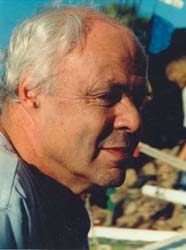 Dick Marek was a legendary book editor and later an extremely successful writer and ghost writer. He lived in Westport, Connecticut with his second wife, the writer and therapist, Dalma Heyn.
Dick Marek was a legendary book editor and later an extremely successful writer and ghost writer. He lived in Westport, Connecticut with his second wife, the writer and therapist, Dalma Heyn.
I had the honor to interview Dick for Writerscast in 2015, in which he talked at length about what many consider to be the golden age of American trade book publishing, of which he was an integral part. And I had the great pleasure to have worked with Dick and Dalma on one of their jointly written novels, A Godsend some years ago. He was a wonderful person and a uniquely talented literary being.
Dan Woog wrote a lovely piece remembering Dick for his great Westport centric blog 06880 (the quote by Dick below comes from Dan’s piece.)
Richard started as a junior acquisitions editor at Macmillan and worked my way up to becoming President and Publisher of E.P. Dutton. He edited James Baldwin’s last five books, Robert Ludlum’s first nine books and novels by Peter Straub, Thomas Harris, including The Silence of the Lambs, and also Ben Stein, and David Morrell. Marek was a novelist himself. His 1987 Works of Genius concerns the psychological takeover of his literary agent by a great (and narcissistic) modern writer.
Richard and Dalma were fixtures in the Westport literary community. Together they wrote How to Fall in Love: A Novel, which was published last year.
“Love is more important than anything else in this world,” Marek said shortly before he died. “If you’re lucky enough to have it — and write about it — you will have a happy life.”
We will miss you, Richard.
New York Times obituary here.
Publishing Talks: David Wilk interviews Brian Birnbaum of Dead Rabbits
December 31, 2019 by David
Filed under PublishingTalks, The Future
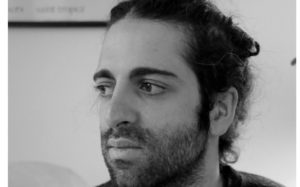 Publishing Talks began as a series of conversations with book industry professionals and others involved in media and technology, mostly talking about the future of publishing, books, and culture. As every media business continues to experience disruption and change, I’ve spent time talking with some of the people involved in our industry about how publishing might evolve as it is affected by technology and the larger context of culture and economics.
Publishing Talks began as a series of conversations with book industry professionals and others involved in media and technology, mostly talking about the future of publishing, books, and culture. As every media business continues to experience disruption and change, I’ve spent time talking with some of the people involved in our industry about how publishing might evolve as it is affected by technology and the larger context of culture and economics.
Some time back, this interview series broadened to include conversations that go beyond the future of publishing. In an effort to document the literary world, I’ve talked with a variety of editors and publishers who have been innovators and leaders in independent publishing in the past and the present, and continue to explore the ebb and flow of writing, books, and publishing in all sorts of forms and formats, as change continues to be the one constant we can count on.
There are many reasons to establish an independent literary venture, but usually the urge is based in the most basic impulse to publish, i.e. make public, work that matters, either to an individual, or a group of writers clustered around a particular geography or literary pursuit. Dead Rabbits is one such new venture. Its founders began by creating a poetry reading in a place that was underserved. The Dead Rabbits Reading Series was founded in 2014 by Devin Kelly (Sarah Lawrence MFA ’15), Katie Longofono (Sarah Lawrence MFA ’14), and Katie Rainey (Sarah Lawrence MFA ’14) as a way of providing a place for an emerging young New York City literary scene to exist and thrive in Upper Manhattan.
Out of that extremely successful undertaking – with a long list of readers with whom I confess I was not familiar – Katie Rainey, Jonathan Lee Kay and Brian Birnbaum subsequently founded Dead Rabbits Books (“Books that Matter”). Their first publication is Brian Birnbaum’s novel, Emerald City, with several more books planned and ambitions to establish a long term self sustaining publishing venture.
I’ve talked to many folks in publishing who have spent years at their work and thought it would be a useful counterpoint to talk to someone new, on the other end of the spectrum, is just beginning the struggle to publish and reach readers in new ways that have continued to emerge over the past few years.
Dead Rabbits is emblematic of a new generation of writers and editors that is in many ways wrestling with the same challenges that have faced every generation before them, but the current environment is also very different than it has been at any time in the past. Social media creates unmatched opportunities for communication and at the same time a vast array of issues for any new enterprise trying to be discovered. It seems there are more poets and independent presses than ever, all competing for an audience of readers for whom poetry is yet another option for consumption alongside every other media form. Which makes this a very interesting time indeed. Good luck to Dead Rabbits, (in all their various literary ventures) – this is a group of young literary adventurers who seem to have some very good ideas as well as access to some very good writing. Anyone interested in the current literary scene should listen to this podcast.
Podcast: Play in new window | Download
Karl Marlantes: Deep River, a Novel
November 19, 2019 by David
Filed under Fiction, WritersCast
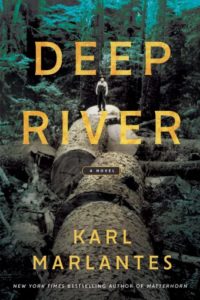 Deep River – Karl Marlantes – 978-0-8021-2538-5 – Atlantic Monthly Press – Hardcover – 736 pages – $30 – July 2, 2019 – ebook version widely available at lower prices.
Deep River – Karl Marlantes – 978-0-8021-2538-5 – Atlantic Monthly Press – Hardcover – 736 pages – $30 – July 2, 2019 – ebook version widely available at lower prices.
“Deep River seems a work born from Willa Cather by way of Upton Sinclair. But this new book is its own animal, and it’s something of a masterpiece… In Deep River, [Aino] takes her place beside Antonia Shimerda as one of the great heroines of literature.”—BookPage (starred review)
Several years ago I discovered Karl Marlantes’ first novel, Matterhorn, which is a loosely autobiographical novel about the Vietnam War, in which Karl served as a Marine lieutenant. I think that is one of the best war novels I have ever read and was pleased to interview Karl about that book.
That book was followed by a nonfiction book called What it is Like to Go to War, which I also read and was affected by. What I said in 2011 still holds true: this book is a deeply thoughtful and moving work of nonfiction about the nature and meaning of war, and what it means to the individual warriors who participate who fight, as well as to the society that gives them that responsibility.
It took Marlantes almost thirty years to write and rewrite Matterhorn. Almost ten years after he completed that book, he has now turned in a completely different book, an historical novel set in the early 1900s, starting in Russian occupied Finland and moving to the Pacific Northwest. The three Koski siblings, Ilmari, Matti, and the politically radical young Aino, flee Russian oppression and come to the United States.
They join a community of other Finns in the logging area in southern Washington, during a time when massive trees of the old growth forest are being harvested by hard working men and dangerous technology. It is fertile ground for the establishment of radical labor movements like the IWW (Industrial Workers of the World, also known as the Wobblies). The two Koski brothers build their lives in this environment amid danger and many challenges, while Aino, just one of the book’s many also hard working independent women, works to build a union in an environment where organized labor is not welcomed by the logging industry or the power structures of the day.
Karl has built this novel following the structure and characters of the great stories of the Finnish oral tradition, written down in the nineteenth century as the Kalevala. It is a truly magisterial novel that weaves together so many strands of American and immigrant cultures, documents the struggles of the early twentieth century in the great forests of the Pacific Northwest, and shows us how human beings find a way to make meaningful lives despite the harshest challenges. Nothing comes easy for the Koskis their friends and families, but everything about them is redemptive and strong. It’s impossible to read this book and not be moved.
Reading Deep River is a commitment – it’s a long book – and there are inevitably times when it becomes difficult to keep track of the whole story and the many compelling characters in the book. That is not a criticism. The book is gripping, and well worth the time and attention of the reader. And it is impossible not to read it in the context of our current political circumstance. Reading about the sacrifices made by workers in the early twentieth century, to make advances for labor that are now taken for granted, and imagining their struggles as evidenced by the characters in this book, who are so thoroughly human in their differences and outlooks, personalities and beliefs, brings forth a range of thoughts about what has become of America today. We live in a world that others made great sacrifices for, and have somehow managed to avoid making sacrifices of our own. The people of Deep River as imagined by Karl Marlantes, deserve better from us.
I had the great pleasure to interview Karl in New Haven in a building on the Yale campus, where he was visiting during his book tour.
Karl Marlantes graduated from Yale University and was a Rhodes Scholar at Oxford University, before serving as a Marine in Vietnam, where he was awarded the Navy Cross, the Bronze Star, two Navy Commendation Medals for valor, two Purple Hearts, and ten air medals. He is the author of the novel, Matterhorn and a work of nonfiction, What It Is Like to Go to War. He lives now in Washington State.
Buy Deep River from RJ Julia here.
Podcast: Play in new window | Download
Fred Waitzkin: Deep Water Blues, a Novel
August 18, 2019 by David
Filed under Fiction, WritersCast
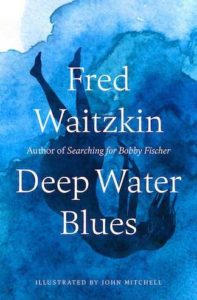 Deep Water Blues: A Novel – Fred Waitzkin – 9781504057745 – 160 pages – Open Road Media – paperback – May 28, 2019 – $17.00 – ebook versions available at lower prices.
Deep Water Blues: A Novel – Fred Waitzkin – 9781504057745 – 160 pages – Open Road Media – paperback – May 28, 2019 – $17.00 – ebook versions available at lower prices.
Fred Waitzkin’s Deep Water Blues is a surprisingly affecting short novel based to a great extent on his personal experiences in a small boat on the open water and islands of the Caribbean. Because it is based in so much lived experience, it has an authenticity that shines through in every page. In Deep Water Blues three older men (including the boat’s owner) and one younger man, a painter who has never been to sea, leave Ft. Lauderdale on an old boat heading for a Bahamian island that has an almost mythical story and appeal. Each is there for a different reason and each will gain something different from their adventure. But the story is really about the island and the mysteries of what happened there.
When I first started reading this book, I did not expect to find it as compelling as I did in the end. There’s alot more here than initially meets the eye, and this is a book I can recommend to readers.
Waitzkin calls his book a “curated blend of real-life experience and fiction.” Deep Water Blues tells a compelling story about an unusual man in an exotic place, an almost mythical story whose hero suffers a classic fate and redemption in a mysterious and beautiful location, bringing to mind Shakespearean and Biblical storytelling. Waitzkin writes in spare prose that carries his story through to its exciting end, and makes a short book impactful beyond its length.
Fred Waitzkin was born in Cambridge Massachusetts. He was an English major at Kenyon College in Ohio, then taught English at The College of the Virgin Islands, where he also got to pursue his love of fishing for big game fish. Fred and his wife moved to New York City, where Waitzkin wrote feature journalism, personal essays and reviews for numerous magazines including Esquire, Forbes, the New York Times Sunday Magazine, the New York Times Book Review, New York Magazine, Outside Magazine, and Sports Illustrated.
Waitzkin’s first book was Searching for Bobby Fischer. Published in 1984, it’s the story of three years in the lives of Fred and his chess prodigy son, Josh Waitzkin. The book became an internationally acclaimed best seller, and the film based on it was nominated for an academy award.
Mortal Games, his biography of world chess champion, Garry Kasparov was published in 1993, and was followed in 2000 by The Last Marlin, a memoir. The Dream Merchant, Waitzkin’s first novel, was published in 2013 – Deep Water Blues is his second published work of fiction. Fred still lives in Manhattan with his wife Bonnie, and still spends as much time as possible on his old boat, Ebb Tide.
It was my pleasure to speak with Fred, and while we talked about the book at hand, our conversation went into a variety of related coves and channels.
Visit Fred Waitzkin’s website to learn more about him and his writing.
“Deep Water Blues does what all fine literature aspires for – it transports readers to another time and place, in this case, to a sleepy, lush island deep in the Bahamas. Fred Waitzkin writes about life, sex and violence with aplomb, and Bobby Little is a tragic hero fit for the Greek myths. Hope to see everyone on Rum Cay soon.” – Matt Gallagher, author of Youngblood
“Fred Waitzkin effortlessly recreates a singular world with uncanny insight and humor. His language is remarkable for its clarity and simplicity. Yet his themes are profound. This is like sitting by a fire with a master storyteller whose true power is in the realm of imagination and magic.” – Gabriel Byrne, actor and director
Podcast: Play in new window | Download
Adina Hoffman: Ben Hecht: Fighting Words, Moving Pictures
June 30, 2019 by David
Filed under Non-Fiction, WritersCast
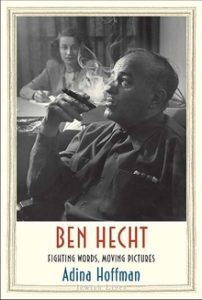 Ben Hecht: Fighting Words, Moving Pictures – Adina Hoffman – 9780300180428 – Yale University Press – Hardcover – 264 pages – $26 – February 12, 2019 – ebook versions available at lower prices
Ben Hecht: Fighting Words, Moving Pictures – Adina Hoffman – 9780300180428 – Yale University Press – Hardcover – 264 pages – $26 – February 12, 2019 – ebook versions available at lower prices
I grew up in a family where the movie business was in our blood, and part of the conversations of everyday life, so I have long known about – and appreciated – the amazing screen writing of Ben Hecht. Hecht’s many screenplays in many ways established and defined what is now standard movie practice. He wrote some of the greatest and most watched films in history, and made a well paid career out of “doctoring” other writers’ scripts. Hollywood was his reluctant artistic base for many years, though he would never be completely comfortable there.
Reading this very comprehensive, but highly readable biography by Adina Hoffman, brought Hecht’s life and work into focus for me for the first time. Hecht’s story was that of a classic 20th century second generation Jewish immigrant. He was raised in Wisconsin, made his way to Chicago, became a newspaper writer and then a novelist in the glory years after World War I, where he helped create and define the literary scene in that great city, before moving to New York, where he truly established himself as literary star.
Hecht and Charles MacArthur together wrote the now-classic play, The Front Page, becoming writing partners and pals for many years thereafter. Some of Hecht’s most famous screenplays include Scarface, Gone with the Wind, Stagecoach, Notorious and His Girl Friday. Hecht worked on literally hundreds of films, was a powerful enough writer to be able to be given the opportunity to produce four films with MacArthur (a mis-adventure described wonderfully by Hoffman). Hecht worked with some of the greatest directors, producers and actors in 20th century film. His work literally defined what a Hollywood movie could be, and much of what we think about 20th century American culture is derived from his cynical, yet optimistic worldview.
Hecht’s many novels and nonfiction books are not widely read or known today, and according to Hoffman, who has read them all, some are lost to literary history for good reason. Still, it is quite possible that this fully formed biography with its clear eyed evaluation of Hecht as passionate human, brilliant intellect and outstanding writer, will help their cause. For myself, I have made a commitment to read at least one or two of the books that Hoffman tells us are important enough to seek out, including at least one novel. I have thought about reading Hecht’s very early novel Fantazius Mallare: A Mysterious Oath, even though Hoffman pretty much dismisses it, except for one great sentence that is said to have inspired Ginsberg’s Howl. But it is his autobiography, A Child of the Century that calls out to me the most, and that I will be reading soon.
Though he was decidedly a non-secular Jew during World War II, Hecht rediscovered his Jewish identity and became a powerful public voice pressuring American politicians to save the Jews of Europe. After the war, Hecht’s Zionism led him to support the nascent Jewish state of Israel with the burning fervor of a convert, his trademark enthusiasm focused on building a safe haven for Jews, which ironically, he never visited. Hecht, as Hoffman shows us, was a complicated human being – and frequently an unforgivable one as well.
Ben Hecht was emblematic as the “child of the [20th] century” who helped to define modern Jewish America and modern popular culture. Adina Hoffman is a terrific writer and a gifted storyteller, perfectly suited to tell this story. Thanks to Yale University Press for creating an absolutely beautiful book, one that serves her writing well, and makes reading it a better experience.
Adina Hoffman is an essayist and biographer who splits her time between New Haven and Jerusalem. Fortunately, she was in New Haven when I wanted to talk to her about this book and the work that went into it. Hoffman is the author of four books, including Till We Have Built Jerusalem: Architects of a New City and My Happiness Bears No Relation to Happiness: A Poet’s Life in the Palestinian Century. She was a film critic for the American Prospect and the Jerusalem Post, and was a founder and editor of Ibis Editions, a small press devoted to the publication of the literature of the Levant. She has been a visiting professor at Wesleyan University, Middlebury College, and NYU, and was notably one of the inaugural (2013) winners of the Windham Campbell prize. Read more about Adina and Ibis Editions here.
And you can find a good bibliographical of Hecht’s work here.
Note to listeners, this interview was recording live in a room with a bit of echo, so apologies to all for the sound quality.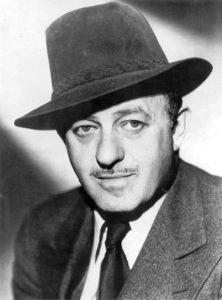

Podcast: Play in new window | Download
Peter Rock: The Night Swimmers (A Novel)
April 7, 2019 by David
Filed under Fiction, WritersCast
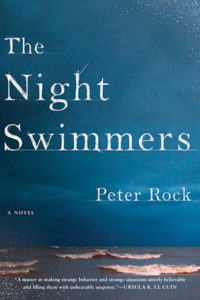 The Night Swimmers – A Novel – Peter Rock – ISBN 9781641290005 – Soho Press – Hardcover – 272 pages – $25.00 – March 12, 2019 – ebook versions available at lower prices.
The Night Swimmers – A Novel – Peter Rock – ISBN 9781641290005 – Soho Press – Hardcover – 272 pages – $25.00 – March 12, 2019 – ebook versions available at lower prices.
As I have said here before, one of the things I like best about doing the Writerscast interviews is that it’s introduced me to the work of many writers I would not have discovered on my own. The Night Swimmers is a perfect example. Peter Rock has been writing extremely fine fiction for many years, and yet I had never run across his work before, which still seems quite surprising to me, given the nature of his work.
Peter’s autobiographical novel captured my imagination from the outset. The writing is luminous and personal, dreamy, yet descriptive. His narrator is a young aspiring writer living temporarily in beautiful Door County in the northern reaches of Wisconsin’s Lake Michigan coastline. He’s bit lost, maybe stuck in his inability to see himself as an adult. He meets a young widow, Mrs. Abel, who is, like him, not exactly clear about herself and who she wants to be. She is older, attractive, smart and mysterious. The narrator finds himself swimming with Mrs. Abel at night without really knowing why, although there is a strong undercurrent of attraction between them, a tension that defines the essential mystery of their relationship, and the way they swim in the depths of the lake across large distances is similar to the ebb and flow of the narrator’s own life. And then Mrs. Abel disappears.
Some twenty years later, the narrator, who is now married, living in San Francisco and the father of two daughters, finds himself trying once again to understand what happened that summer, his psychic history rising to capture him like a deep lake current he used to swim in. He reads old letters and notebooks from the past, explores his relationship to a former lover, tries to understand through a sort of personal archeological expedition the world he once lived in and still cannot fully understand. Back in Door County once again, he tries to find out what happened to the elusive Mrs. Abel, and again he enters the deep lake waters to swim across the night.
Scattered throughout the book is the evidence of the narrator’s archeological exploration of his own history, pieces of paper, old emails, quotations from poets, and references to the extraordinary and strange psychic photographer Ted Serios. This book is a sort of literary pastiche that really could exist in multiple forms and formats, reflecting the author’s psychic imagination crossing over time and space through the medium of memory.
The Night Swimmers is a beautiful, complicated and challenging work of literary inspiration I found completely engaging. And it was a pleasure then, to have the opportunity to speak with Peter Rock about his fine novel.
“Peter Rock has written a weird and haunting story about a younger man and an older woman who like to swim in the dark. Happily The Night Swimmers is no male coming of age story. Instead their secret nightly practice in a dark and foreboding lake shimmers as a queer refusal for either of them to grow up right.”
—Eileen Myles, author of Afterglow
I recommend visiting Rock’s website, and follow the link to The Night Swimmers page, where there are some great visuals related to the book.
Peter Rock was born and raised in Salt Lake City. He is the author of several novels SPELLS, Klickitat, The Shelter Cycle, My Abandonment, The Bewildered, The Ambidextrist, Carnival Wolves and This Is the Place, as well as a story collection, The Unsettling. Rock attended Deep Springs College, received a BA in English from Yale University, and was a Wallace Stegner Fellow at Stanford University. He lives in Portland, Oregon, where he is a Professor in the English Department of Reed College. Leave No Trace, the film adaptation of My Abandonment, directed by Debra Granik, premiered at Sundance and Cannes and was released in 2018.
Podcast: Play in new window | Download
Maureen Owen and Barbara Henning reading in Tucson, Arizona
March 3, 2019 by David
Filed under AuthorsVoices
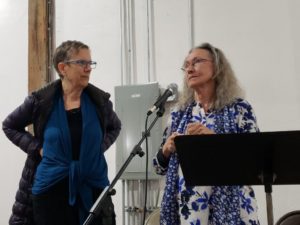 What a great trip! Starting January 18, 2019, with a reading at McNally Jackson Bookstore in Brooklyn, New York, poets Maureen Owen and Barbara Henning, started a cross country journey together (you can view their trip itinerary here).
What a great trip! Starting January 18, 2019, with a reading at McNally Jackson Bookstore in Brooklyn, New York, poets Maureen Owen and Barbara Henning, started a cross country journey together (you can view their trip itinerary here).
Appropriately, their story and journey began in Brooklyn, where Barbara lives, and this amazing cross-country jaunt ends in Denver two months later, where Maureen lives.
The two writers have been blogging about their adventure here – their writing is terrific and fun, it is always fresh and lively, truly poets’ reportage, and reading their travel log will make you feel like you are along for the ride with them. They are having alot of fun and meeting and talking with some wonderful people along the way. They are getting to see some beautiful parts of our country too. Their two months on the road will feature 16 public events, and innumerable anecdotes and stories. It’s really fun to follow along with them as they travel, and when they are done, this will make a really interesting book.
I had the good fortune to be in Tucson, Arizona, when the two writers arrived there on February 14. Maureen is an old friend and colleague, so it was wonderful to get together with her, and to meet Barbara for the first time. When I went to hear them read for the POG Poetry reading series at the Steinfeld Warehouse Community Art Center, 101 West 6th Tucson on Saturday, February 16, and I recorded the event for this Authors Voices series here on Writerscast.
Local writer Steve Salmoni introduced the event. Poet and publisher (Chax Press) Charles Alexander introduced Maureen, and artist Cynthia Miller introduced Barbara, who lived in Tucson for a few years and has many friends there still.
It was a great event, and a wonderful opportunity to hear two terrific writers, both of whom engage with their audience and their writing. I’ve known Maureen for a long time, and believe she is one of the best poets of our time. Getting to hear Barbara Henning was a treat for me, as she is also a terrific writer of both poetry and fiction. I’m very pleased to have the opportunity to present this reading here.
Poet Maureen Owen was born in Minnesota, lived and worked in New York City and Connecticut, and has been living in Denver for a number of years, where she has long taught at nearby Naropa University. She was the founder of Telephone magazine and Telephone Books, worked at the Poetry Project in NYC, and is the author of a number of wonderful collections of poems.
Barbara Henning is a poet and fiction writer, born in Detroit, who has lived mostly in New York and Tucson since the early eighties. Aside from being the author of a number of books of poetry and fiction, she was also the editor of a book of interviews, Looking Up Harryette Mullen, and The Selected Prose of Bobbie Louise Hawkins. She is professor emeritus at Long Island University, where she taught for many years.
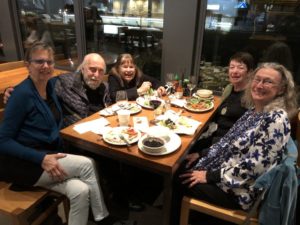

Podcast: Play in new window | Download


